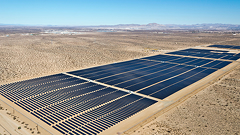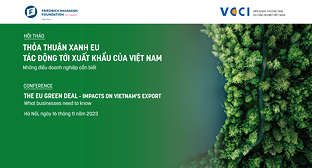New U.S. Solar Panel Tariff Intensifies Sino-American Green Tech War
24/04/2024 01:08

The Sino-American trade war may be old news, but now a new battlefield is front and center: green tech. During her controversial visit to China, Secretary Janet Yellen made waves by criticizing China’s excess industrial capacity. Secretary Yellen warned the Chinese that retaliatory tariffs would be levied if this wasn’t addressed while simultaneously making the case to the rest of the world that Chinese production threatened nascent industries worldwide. These quarrels have been a hallmark of Sino-American relations for decades.
What is novel is that the focus of these complaints isn’t cheap consumer goods but the cutting-edge technologies of the 21st century.
The Chinese probably thought Secretary Yellen was bluffing. She was not. In a dramatic reversal, the Biden administration signaled on April 17th that it had accepted South Korea’s Hanwha QCells pleas to reinstate an array of regulations against Chinese solar. Not only does this instantly pit multiple countries against China, but it dramatically reverses a previous 2014 World Trade Organization arbitration verdict between the U.S. and China, which Beijing partially won. It also acts as a drastic broadside against China’s recent WTO EVs case filed in March 2024.
China has every incentive to prevent these tariffs, as it has surpassed the U.S. in the renewable energy and related products markets.
Today, it has a near-monopoly over many base inputs that make up green tech, as it controls over 80 % of the globe's critical mineral refining. This dominance extends to more value-added activities, such as lithium-ion batteries, 70 % of which China produces, and solar panels, where China makes up 83 % of the market as of 2023. All this domestic industrial production has given China an enviable edge, which translates into sales. These sales aren’t limited to solar panels. In the last quarter of 2023, China's leading EV maker, BYD, surpassed Tesla in sales, selling over 520,000 vehicles to Tesla'sTSLA +1.9% 480,000.
However, although many of these gains are due to unfair trade practices or intellectual copyright infringement, they remain undeniable advantages. Figures such as these are making Washington less averse to a once-taboo word: protectionism. Nevertheless, tariffs are not a panacea. Chinese labor will remain cheaper, while key inputs, such as critical minerals, cost less in China. Borrowing is also inexpensive, as Chinese banks are on an industrial lending spree to such a degree that China’s Central Bank is raising the alarm – in defiance of China’s Five-Year Plan. Then, there is the elephant in the room: the mass of Chinese state subsidies for green technology.
U.S. efforts, such as the Inflation Reduction Act and the Build Back Better Plan, are inflationary initiatives that pale in comparison to Chinese efforts. Former Congressman and WTO jurist Jim Bacchus, who supported normalizing trade relations with China, says, “Under the prevailing economic and political circumstances in the United States and the rest of the world, eliminating tariffs is all the more difficult… To remove tariffs, there must first be a desire to remove them, and there is scant evidence that removing tariffs is a priority for the Biden administration.”
The impulse behind tariffs is understandable. Much of China’s current dominance came from bad-faith initiatives that abused America’s previous prima facie inclination towards free trade. Tariffs are politically popular in the swing states lining the Rust Belt. They insulate increasingly important industrial sectors from competition, preserving American Rust Belt jobs, at least in the short run, and they create a narrative that blames outsiders for problems. However, good politics isn’t always good policy.
Tariffs ultimately reduce competitiveness and, in the context of international competition, could be fatal. Some policies can punish Chinese manufacturers and discourage state subsidies. Washington could opt for a Carbon Border Adjustment Mechanism (CBAM), a tax that could be applied to industries based on the intensity of carbon expelled during manufacturing (but would raise significant concerns under WTO rules). This would decisively advantage American and European manufacturers and is already moving toward implementation in the European Union. There are already multiple bipartisan CBAM proposals being refined in the U.S. Congress.
A CBAM should be paired with a market-based Emissions Carbon Trading (ECT) scheme. An ECT would enable manufacturers of green tech to operate more efficiently since any system can be constructed to take advantage of these industries and combat unfair foreign trade practices. Unfortunately, despite its history as a pragmatic market-based proposal, the toxic political dialogue surrounding carbon trading in the U.S. means the multiple bills currently considered by the 118th Congress will certainly languish. Meanwhile, China has already identified ECTs as a valuable tool. China launched its ECT system in 2021 and in February 2024, to further advantage national manufacturers.
The U.S. and China are both playing an understandable but dangerous game. Tariffs inspire retaliation, and the more the world throws up tariffs, the less prosperous we all become. Not only is a zero-sum game afoot, which is slowly eroding free trade, but this fraying of the international trade regime appears to undermine critical institutions, such as the WTO, which serve as the underappreciated bedrock of global prosperity. If the U.S. and China do not find a way to pull back from tariff wars and constrain their competition, U.S. consumers and the world as a whole will be worse off.
Source:Forbes
Các tin khác
- Vietnamese pomelo to be exported to Australia (04/05/2024)
- Ample room to increase Vietnamese coffee exports to Singaporean market (04/05/2024)
- Beef tariff disadvantage top of mind on trade mission to South Korea (04/05/2024)
- Cooperatives urged to focus on branding to expand exports of organic teas (04/05/2024)
- Leather and footwear exports grow steadily despite mounting pressure (04/05/2024)
 Home
Home
 About Us
About Us




















